#compulsory cisheteronormativity
Explore tagged Tumblr posts
Text
Alongside the notion that being cis and heterosexual is the only acceptable way to exist, cisheteronormativity operates on a foundation of understandings, assumptions, mandates, expectations, and permissions for heterosexual people, What it demands, above all, is compliance with and allegiance to heterosexuality. Asexuals do not meet these demands, and this places us squarely outside of the scripted heterosexual experience. Asexuality is always a site of subversion and resistance to cisheteronormativity itself, and is that not what queerness is? What queer exclusionists claim is the "straight-passing" of asexuals is nothing more than others projecting their own heteronormative assumptions onto us based on their own narrow notions of how queerness should be performed. It's rooted in a fundamental belief—although likely a subconscious one—that everyone is categorically heterosexual until the moment they begin to experience, express, and act on sexual attraction to the same gender or multiple genders. This is just one of the ways that cisheteronormativity becomes reproduced in queer communities and queer modes of thinking. It constructs heterosexuality not simply as a default orientation, but also as the blank slate that queerness must be written onto. An insult to us all.
Asexuals being assumed as heterosexual by others, based on heteronormative beliefs, does not amount to asexuals "passing for straight." We are assumed to be heterosexual because heterosexuality is compulsorily seen as the default orientation, because people continually fail to learn about asexuality and asexual people when presented with opportunities to do so, and because they often refuse to accept our asexuality as a valid orientation to begin with. What other people choose to see—and what they choose not to believe—from their own biased perspective is not the responsibility or fault of asexuals. Being invisibilized, constantly wading through the expectations and projections of compulsory (hetero)sexuality, and having others consistently assert themselves as the authorities on our lives, experiences, and identities while refusing us the right to have this authority ourselves is not and never will be "passing for straight."
—Sherronda J. Brown, Refusing Compulsory Sexuality: A Black Asexual Lens on Our Sex-Obsessed Culture (2022), p 36
292 notes
·
View notes
Text
deltarune was crazy making a route centered around deeply ingrained compulsory cisheteronormativity and repressive thought patterns tearing through the fantasy world, theming that everyone misses except for the most insane fanart you'll ever see
13 notes
·
View notes
Text
Kink belongs at pride because the compulsion to be vanilla, puritanical and boring is what characterizes compulsory cishet culture.
Queerness is kinky, experimental, fun and intense. This is one of the greatest advantages of queerness over cisheteronormativity
#philosophy#queer#politics#bi#gay#gay pride#pride#trans pride#transgender#trans#bisexual#pansexual#pan#nonbinary#lgbtq#lgbt#genderfluid#ace
27 notes
·
View notes
Text
Compulsory cisheteronormativity is killing us all but please tell me about how you don’t like when people use they/them pronouns.
2 notes
·
View notes
Text
i’ve always really resented the gender roles and heteronormative expectations imposed on me but to me there’s no point in identifying as anything besides cishet because i will never be able to actualize a life where i can be anything besides that. i know that sounds depressing and like i have huge suppressed dysphoria and internalized compulsory heterosexuality but identity-as-label means nothing to me without political impetus and action and i really do not think i can do that. if i can’t move in ways that actively defy cisheteronormativity i believe identifying as anything besides cishet is simply dishonest because my positionality is functionally indistinguishable
0 notes
Text
When I was in grade 6, my cousin had started growing out his hair, to donate it to the folks who make wigs for cancer patients, I thought that seemed like a cool idea, so I decided to do the same.
It took a super long time to grow out what was essentially a buzz cut (I got my hair cut in the summer of 2007 before I went to a week long camp, so I waited a year to start too), so it wasn’t until the end of grade 9 when I finally had 12′’ of hair to cut off and donate (the minimum number for them to be able to make a wig with the strands).
While I had that long hair, there was a super long while when I looked like a chubby, shaggy haired boy (not that those are bad, just not what I ever wanted to look like), but when my hair started to be long enough to put it into a ponytail, oh wow was that exciting in a way I did not understand at the time. A lot of adults addressed me with feminine pronouns (both those who didn’t know my name, and those who just saw me as part of a group of girls walking in the halls at school). Being read as female didn’t bother me at the time, but I didn’t really understand that, I couldn’t stop marveling/fixating on it though. I remember telling everyone I knew about every single time I was read as female by an adult, and never once thinking that it could mean anything deeper than the long hair on my head.
Around the start of grade 9, I hadn’t really figured out that you could move your ponytail higher, and so I always had a low ponytail, which left a lot of hair around my face not at all contained. This was also when everyone was talking about Juno, and I remember realising at some point that I kind of looked like Ellen Page did in the movie, and again, I enjoyed that, but didn’t really explore why that might be any more than just noticing it.
I remember my best friend from high school wanting/offering to straighten my hair, and (possibly??) suggesting makeup, which I tuned down because I already dealt with enough bullying from boys at school that made me fear being seen as too feminine, but to be honest, I’m pretty sure I secretly hoped that she would bring it up again, but I guess my stated reason was enough of a deterrent (I said I didn’t want to damage my hair with a straightener, since I was planning on giving it away).
A few days after grade 10 was over, I got my hair cut (First Choice Haircutters quickly became my last choice when they wasted a lot of hair), and my dad shaved my head for me from the super short buzz to actual bald.
I spent the rest of highschool, and the first 3 years of university with hair only slightly longer than a buzz cut.
I don’t think I really had many more thoughts about my gender until after I started to dye my hair and I was living downtown and approaching the end of my university time.
#mine#personal#text#compulsory cisheteronormativity#cisheteronormativity#Paislee talks about trans stuff
6 notes
·
View notes
Text
" Coffee, ice cream, and alcohol. These are three things that always elicit a look of shock, horror, and disbelief or even an audible gasp whenever someone learns that I don’t like them. How can you not like coffee? But everyone likes ice cream, it’s delicious! So you don’t like any kind of alcohol? They either pity me or become irrationally angry about my aversions—which I did not consciously choose to have. They try to convince me that I simply haven’t tried coffee, ice cream, or alcohol in the right way yet, and they pressure me to try it again at some undetermined point in the future. Sometimes it feels like moral outrage. Sometimes it feels like they have instantly become offended, either because they assume that I have insulted something that brings them great pleasure, comfort, and joy or because they think I’m judging them. I’m not. I have simply tried these things—on multiple occasions, with different flavors, and in various situations—and I have determined that I don’t like them and I currently have no interest in trying them again, in any iteration. This is apparently a difficult thing for most people to grasp, and I have seen similar reactions when people learn about asexuality.
Sex is not a human necessity or obligation (and neither is romance). Sex is not universally desired and sexual attraction is not a universal experience. People on the asexuality spectrum acknowledge and embody these unpopular truths, and we are ostracized for it. Not only do we have our very existence questioned by a dominant society which cannot stretch its imagination far enough to believe in the validity of orientations outside of those deemed normal, but we are also often denied space in the very community that takes pride in the challenging of those norms. Asexual is queer, but many queer allosexuals spend an inordinate amount of energy trying to convince us otherwise and actively trying to shut us out of the queer spaces that should be safe havens for everyone with (ethical) non-normative sexualities and attractions.
So many people see queerness as being principally defined by which gender(s) one has a sexual and/or romantic affinity towards (or which gender(s) one is). Historically, this is largely how it has been defined and understood, by both queer and cishetero folks. They have only understood queerness through the non-normative performances of and attractions related to sex (and gender), not through the denial or subversion of these performances and attractions. It is my belief that asexuality would be better understood if we collectively expanded and reformed our cultural notions about sex, intimacy, and relationships, and even prescribed gender roles in relation to these things (an essay for another time).
Asexuality would also be better understood if we expanded and reformed our understanding of queerness itself. Over the last few years, it has become increasingly clear to me that far too many people largely define queerness in the same problematic way that many define Black womanhood—by how many harms and heartbreaks we are faced with and by how much danger we are in on a daily basis. I cannot begin to express how dangerous and counterproductive it is to define queerness by our suffering. I’ve had my queerness invalidated and witnessed others have theirs invalidated by self-proclaimed queer experts citing the dangers allosexual queer identities face for being out or not “passing” as straight and/or cis, making all sorts of assumptions about what traumas I may or may not have and how they may or may not be wrapped up with my asexuality.
Conceiving of queerness in this way is in direct contradiction with the project of queer liberation. The point is to normalize queerness so that none of us have to endure, survive, or die from these abuses—whether institutional, individual, interpersonal, structural, public, or private. It is not to define our queerness by whether or not we have experienced these abuses “enough” to be considered authentic. Gatekeeping is not queer liberation. It only serves to reproduce the same harms as compulsory cisheteronormativity."
— Sherronda J. Brown
(colored parts are my own emphasis)
#asexuality#queer#queer history#queer stuff#queer community#lgbtq#lgbt#lgbtq+#ace stuff#rainbow community#long post
750 notes
·
View notes
Note
Is compulsory heterosexuality TERF rhetoric or is it an actual thing?
It’s a real thing, but the term itself was coined by a virulent TERF and was kind of a convoluted concept:
https://whoneedssexed.com/post/186612457789/betterbemeta-gendersmear-gendersmear-im
As a result people have been using instead coercive heteronormativity or even coercive cisheteronormativity to describe the phenomenon of queer folks forcing themselves to date the “opposite” gender and thinking that’s just how things are, as a lot of the issues compounding this behaviour have to do with weird cishet society things.
For example, the idea you’re supposed to hate being with the person you’re with because women and men are inherently at odds, which is a particular aspect that a lot of us have wrestled with (”I must be straight because it’s normal to hate being with my boyfriend/girlfriend” or “I must be straight because it’s normal to hate sex if I’m a woman” and so on). This term also is more accessible to the entire rainbow of LGBT+ experiences.
- mod BP
#coercive heteronormativity#compulsive heterosexuality#queerphobia#homophobia#heteronormativity#cisheteronormativity#Anonymous
28 notes
·
View notes
Text
yeah like honestly everyone figures shit out in their own time, and trying to harangue someone into doing it quicker, or doing it ‘correctly’ is just awful and counter productive
not everyone knows that they are trans instantly and sifting through the very rigid gender bullshit that compulsory cisheteronormativity hammers into you while you’re forming your understanding of yourself as a person growing up can take so much time
I cannot fathom having to sort through all of that and figure it out while in the eye of so many people; particularly when so many of those people are yelling different things at you, or trying to tell you what you are, or just trying to hurry you along so you don’t seem problematic for your exploration. it seems like hell
ok so now that finnster's come out as genderfluid and started taking hrt can we stop trying to force people to choose labels and define their identity. everyone's always talking about support for queer people with unconventional presentations and identities but when someone's not sure about what their gender identity actually is they get criticized for it. finn said in his video that part of the reason why he took so long with coming out was because he wasn't sure what label actually applied to him (and he still isn't even sure if genderfluid feels like the right label for him) and the debate surrounding it was making him uncomfortable. which kind of sucks tbh. idk i dont like how much identity policing ive seen around them it feels like people just aren't comfortable with 'weird' gender presentation
37K notes
·
View notes
Note
Oh my god wait the picking a crush thing is something bi people might do as well? Do you mind elaborating if its not too personal? I know i picked or pushed least one crush on a boy and its been making me question my sexuality, but others felt real. Or in some cases i feel like i pushed myself to have a crush initially but then later my feelings were so strong that i couldnt get over them and its hard to discount them as false
Okay so... yes, some bi people do that, too. The reasons behind that might be different from one individual to another and they might also not be the exact same as they are for gays and lesbians. But the point I was trying to make is that it’s just false to claim that “compulsory heterosexuality” is somehow a phenomenon that only lesbians experience and that it must thus be “proof” of someone being a lesbian. It’s just not accurate when ace and aro people are out there going through that as well. And m-spec people have also made that experience. So to ask “is this compulsory heterosexuality or am I bi?” is a misleading question, you know? [Not to mention all the other reasons why I dislike that term and wish people would finalyl stop using it altogether!]
It’s not hard to imagine that someone who is a closeted bisexual with internalised biphobia might be trying to “hypercorrect” their queerness by pretending to be extra super duper straight. Even if a bi women is genuinely attracted to men she might still feel the need to prove how ~heterosexual~ she is by overperforming her attraction to men and that might include picking crushes just for the sake of that performance. It might also include picking guys that fulfill some kind of “ideal” that the cisheteronormative society pushes as ~what a Real Man should be like~.
My personal experience with this “picking a crush” thing had a bit less to do with my bisexuality but rather with the fact that the kind of men that I was into were old and not conventionally attractive. Ever since I started being interested in men (I was an early bloomer, so I’d say the first signs started when I was ~10/11) I liked MEN, I was never genuinely interested in boys my age or even close to my age. As a child maybe but as soon as puberty hit I never looked back. But of course I quickly learned that my taste in men wasn’t socially acceptable and my peers started making fun of me (”oh, so you like rotten meat, eh?”) and my parents were big Worried. So what I did was trying reaaaaaally hard to be attracted to guys in my class or a year above me. Until my early 20s I also kept trying to date guys that were a maximum of 5 years older than me. But there was never more than ~yeah I guess he’s not ugly~ and whenever one of those boys turned out to actually be interested in me I was like “shit, hell no, fuck, what do I do now? I don’t want this! aaaaaaaaaaaaaaah!!!”
That has never made me doubt that I was attracted to men though. It just reinforced the fact that young guys ain’t doin it for me. And even if it wasn’t directly tied to my bisexuality (which was mostly closeted at the time) there was still an element of “okay so these boys are what I ~should be~ attracted to but I’m not. people think I’m weird for liking old men so I guess something must be wrong with me”. And I kind of blame this whole situation a little for why it took me so long to figure out that I’m bi because like... how could I have dealt with being a queer teenage girl if I couldn’t even manage to be the right kind of straight teenage girl???
Maddie
10 notes
·
View notes
Text
Happy TDOV! Here’s some Queer Hogwarts Headcanons.
Hi, all! My name is Rachel! I’m a trans woman, and I grew up on Harry Potter. I am writing this because we deserve to be seen and also because I know it would piss JK “Gender is Real” Rowling off if she ever read this. Here is how queer students and allies in the different Hogwarts houses would support fellow LGBTQ+ kids in various positive ways.
Disclaimer: Throughout this post, I’ll use the word ‘Queer’ several times. I know that this label doesn’t necessarily represent everyone in the LGBTQ+ community, but I also don’t consider it a slur in modern usage. It has a history of reclamation in the community, and has long been considered a sort of umbrella term for a lot of identities under the rainbow umbrella. Please respect my choice to use this word, as I don’t police others’ language when it comes down to it. If you see yourself as LGBTQ+ but not queer, I see you and respect you.
Gryffindor
When a Gryffindor student is ready to come out as a trans boy or a masculine enby, they can ask LGBTQ+ students in their house to accompany them while they attempt to climb the staircase to the girls’ dormitory and announce their newfound gender identity to the whole house. Without fail, when they climb halfway up and speak their truth the stairs turn into a ramp and they slide back down. Every time that someone does this, there’s a huge party in the common room afterward to celebrate them living their truth for the first time.
Some of the burlier Gryffindor kids decided to bury the hatchet and team up with their Slytherin equals to form a queer community watch. Inspired by Hermione’s work with the fake galleons, they get a list of interested students around the school and start passing out small badges enchanted with the protean charm and a mild shield charm. When a LGBTQ+ student is in trouble, the coin will keep some of the nastier curses from landing while they use it to notify the watch. Before long, these badges become very recognizable to the right people and just wearing one is usually enough to ward off bullies or vouch for LGBTQ+ identity. One of the watch captains is a muggleborn with a special interest in Earthbound, and insists that they should be made to look like Franklin Badges.
A couple years after the Battle of Hogwarts and inspired in part by Dumbledore’s Army, a group of Gryffindors decides to start a weekly queer support group in the Room of Requirement. It’s not the best-kept secret in the world, but the room provides the group with the extra security they need in order to make sure that any closeted students are comfortable showing up.
Ravenclaw
A group of Ravenclaw students begin curating an LGBTQ+ library in their common room, with resource books and fiction about every identity under the rainbow. They maintain a robust lending program, teaming up with Madame Pince to keep a catalog of their books in the library proper. For closeted students who want to learn more about their identities without outing themselves too early, the Ravenclaw students in charge of the queer library become skilled in charming the book covers to disguise their contents and in developing alternate places for book pickup and drop-off.
Appreciating Gryffindor students’ initial efforts to open up a queer support group in the Room of Requirement, LGBTQ+ Ravenclaw students team up with their Hufflepuff counterparts to find facilitators for a number of smaller identity-specific support groups representing everyone from trans students to aspec kids. The Ravenclaw students focus more on intercommunity education, while the Hufflepuffs put more work into inclusive group protocol and making sure that meetings are as affirming as possible for attendees.
A group of out-and-proud Ravenclaws take it upon themselves to get professors to sponsor a series of lectures in the Great Hall about a variety of LGBTQ+ topics. These student-delivered lectures get so popular that they’re able to get several well-known queer celebrity witches and wizards to come and speak on their experiences. They’ve even been able to convince a couple ghosts who identified centuries ago in a way that would now be known as LGBTQ+ to speak on what life was like for them. They’re trying really hard to score an interview with the ghost of one of Sappho’s lovers, but they’ll need a translator first.
Hufflepuff
Being a house founded from the start on the ideals of inclusion and diversity, Hufflepuff already lends itself well to LGBTQ+ community support. On an emotional high from their work with Ravenclaw to found identity-specific support groups, queer Hufflepuffs go further and set up a whole slew of LGBTQ+ mental health community pick-me-ups. These range from Pride parties and dessert buffets full of rainbow food to therapy dog sessions, group Quidditch outings, and trans-inclusive drag shows. Every so often, they convert the Room of Requirement into a fashion closet so that all interested students can try on different kinds of masculine, feminine, and androgynous fashions from the wizarding world and muggle culture alike.
A group of Hufflepuffs recruit students from other houses in starting the first Hogwarts LGBTQ+ support helpline. They bring in counselors from St. Mungo’s about four times a year to train student peer-advocates, and try their best to find students from every identity under the rainbow so that all their bases are covered. Students can reach the helpline at any hour by taking an enchanted pamphlet from a community bulletin board near the Great Hall and saying “I need help” into it. As a bonus, it casts a Muffliato charm around the user so that nobody around them can hear their conversation. This helpline stays active during school breaks so that queer students in need will always have somebody that they can talk to.
Some trans Hufflepuff upperclassmen aspiring to be healers convince Madame Pomfrey to get training on magical transition therapy so that she can administer it to interested students. They put up community notices to field students to her, and sit down with anybody unsure if they’re “trans enough” to reassure them that they definitely are, and that getting transition therapy is their choice alone. They’re now working on getting gender-affirming transmutation procedures subsidized by the school.
Slytherin
Ever skilled at navigating bureaucracy and antiquated rules to get what they want, a group of legal-minded queer Slytherin students team up to defend fellow Hogwarts students who were punished for LGBTQ+-related reasons and so that any homophobic or transphobic staff members know that if they put one toe out of line, they’ll be gone before they can say “Merlin’s Rainbow Flag”. They also exploit several unclear passages in the original Hogwarts’ founding documents to make the school re-label a bunch of washrooms as gender-neutral and establish a new non-binary/gender-neutral dormitory in each of the four houses. Anytime that a new attempt is made to gender-segregate student life or force compulsory cisheteronormativity on school events, Slytherin is there to right wrongs.
A group of formerly-closeted Slytherin students start offering help to anybody in the student body who wants to be socially out but needs to keep their gender identity or sexual orientation hidden from their parents. They advise these students on what to say, how to act, and where in the school it’s safest to present as their true selves. If anybody attempts to out these students-in-need, their lives are made...unpleasant. When a student is ready to come out publicly and to their family, these Slytherin students talk them through how to safely and defensively do it so that if their parents react poorly and try to hurt them financially or otherwise, the damage is minimized. They help to arrange alternate living situations and tuition funds if needed, provide polyjuice potion for trans students going through magical transition therapy who need to hide their identity during a parent visit, and they’ve gotten very skilled at spotting and destroying transphobic and homophobic howlers before they reach their intended recipient.
About to graduate from Hogwarts and get a cushy Ministry job? There are queer Slytherin students who will find you in your OWL year and beyond to offer coaching so that you can effectively support and pass LGBTQ+-inclusive policies at the government level. They offer any information about policy and past precedent that they can (and they have a very well-stocked queer law library in their house common room), help future magical legislators and judiciaries to get better at debunking homophobic and transphobic legal fallacies, and put them in touch with queer and allied Ministry members so that they have multiple people they can keep in touch with in the workplace if they need more support after graduation. Before long, there’s a noticeable shift at the Ministry level towards policies that help LGBTQ+ wizarding kids and adults avoid discrimination and live the lives they want to live. Following their initial success at Hogwarts, this Slytherin-led LGBTQ+ future legislators group reaches out to magical schools in other countries to found satellite chapters and expand their positive influence.
Closing
That’s it for now! I hope that I made you smile and that my ideas resonated. If anybody has any additional headcanons in this area or suggested tweaks for how each house would contribute to LGBTQ+ life at Hogwarts, be sure to reblog this post with your ideas. Happy Trans Day of Visibility!
#thaumaturgethoughts#Harry Potter#trans day of visibility#trans positivity#queer positivity#LGBTQ+ positivity#queer
14 notes
·
View notes
Note
Hey, just wanted to tell y'all that comp het is a term a lot of TERFs use. Heteronormativity and cisheteronormativity are alternatives for it
“compulsory heterosexuality” is a theoretical term that is used in academic feminism. It is awful that TERFs are trying to co-opt academic language, but theoretical language doesn’t change just like that because a hate group is trying to claim it. Just “heteronormativity” or just “cisheteronormativity” aren’t the same theoretical construct and they can’t be used interchangably, although coercive heteronormativity is an alternative term and we do tag comp het posts with that too (or at least I do, I don’t fully know what the other mods tag) and I try to mention it in those to.
The thing with TERFs is that they are, at their core, transphobes that try to hide their transphobia behind real academic feminism, and if we stopped using all the construct they’re trying to co-opt, we would end up without any words to use at all, and they would sit on a mountain of theoretical concepts, and that would just lend them more power. If we refuse this co-opt and keep using the term, they cannot claim it, but if we give in, it will be theirs.
-mod liz
54 notes
·
View notes
Photo
OK, but, listen. I know C*ntrapoints is Problematique and all, but her most recent video “Shame” talks about her struggles with comphet in the frame of existing as a binary trans woman in denial of her lesbian identity and it hits a hell of a lot like this.
I want all trans women to see this scene and really think about the difference between “But do you love him?” and “I care more to be loved. I want to be loved.”
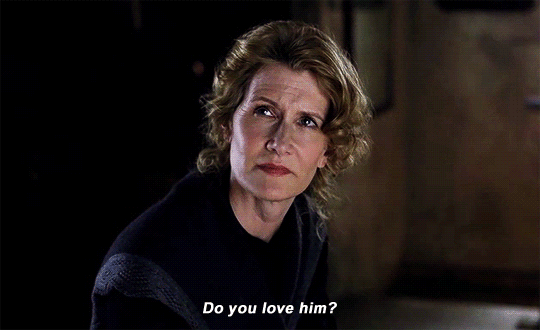
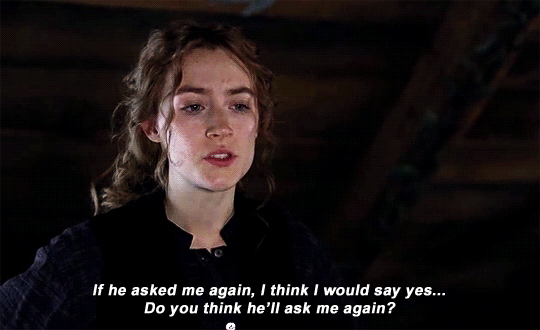
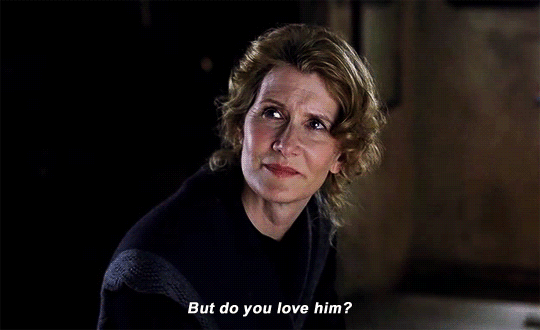
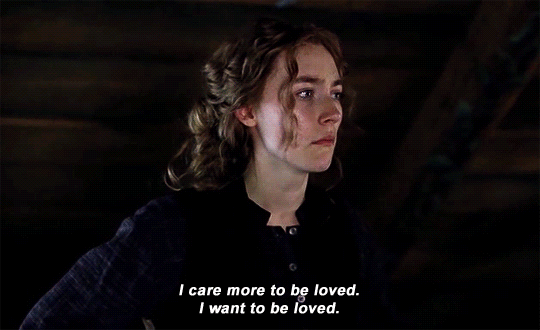
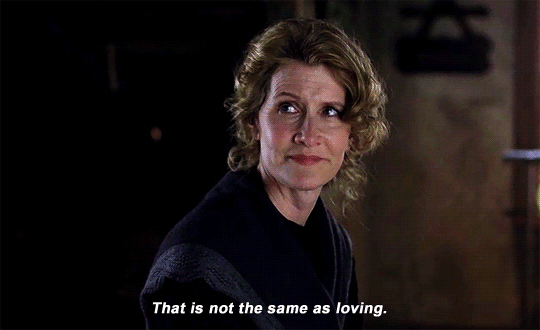
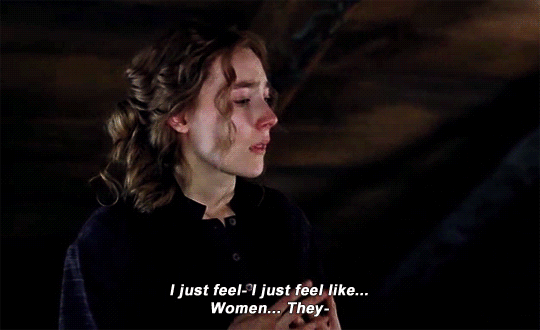
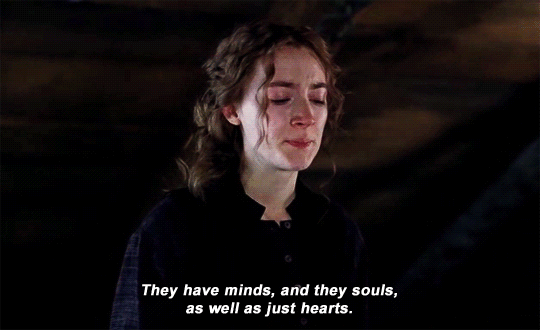
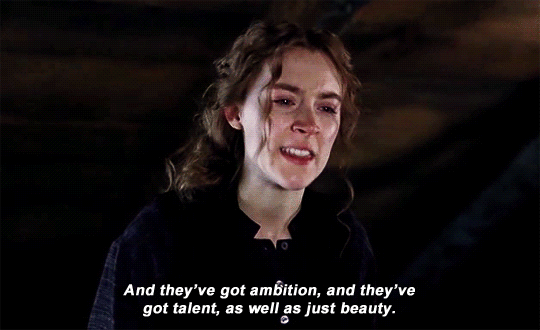

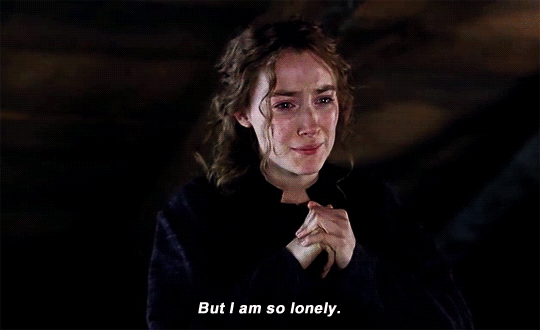
LITTLE WOMEN (2019) written and directed by Greta Gerwig
#gif#Little Women#contrapoints#jo march#lesbian#trans women#compulsory heterosexuality#cisheteronormativity#heteronormativity
31K notes
·
View notes
Note
11, 16, 29, 32, 48
11. Describe the worst date you’ve been on.
HA. okay, buckle in. first, some backstory: by the time i was like 8 or 9, it was very obvious that i was gay, but i didn't understand anything about sexuality, etc. so, when i saw my friends around me hardcore crushing on guys even though they had kissed me "for practice," my impressionable young brain was like "oh, normal people have crushes on boys, and i am normal, so i will have crushes on boys." (hello, compulsory heterosexuality!)
anyway, fast forward to junior year of high school, and my straight trans guy friend who had also fallen into the trap of compulsory cisheteronormativity was desperate to go to prom with this guy from a nearby private school who we knew from confirmation classes at the local catholic church. now, his best friend (who also went to that nearby private school) was the poor soul i had coincidentally imprinted one of my occasional comphet crushes onto. so, my friend asked his "crush" and i asked my "crush."
as it turned out, however, the guy i had asked had, unbeknownst to me, recently scored himself a girlfriend from the nearby sister private school to the one they attended and "wasn't comfortable being someone else's date so soon into his relationship." (lmao, bullshit, but that's a whooooole other can of worms)
anyway, the guy my friend had asked was a bit on the shyer side and did not want to go to a dance at another school if he didn't have a good friend there with him. enter some guy whose name i legitimately do not remember. so here it is:
for my junior prom, i went on a blind date with a guy who was acting as a substitute date for my comphet crush, we had nothing in common, we were clearly not interested in each other, and i went back to my friend's house with all four of them, watched big hero six, and then went home highkey disappointed that i agreed to a blind fucking date with a guy for my first prom. (hmmmmm, wonder why that might've been...)
16. Do you want kids?
kids are cool! but i don't believe i am cut out to be a mother, at least not for a very long time.
29. Do you usually ask other women out or do you wait for them to ask you?
if you were to look up the word "cowardice" in the dictionary, you would see a picture of my face next to it. i have a perpetual fear of rejection, so... the latter.
32. What is the most attractive quality a woman can have?
quick wit. i love a woman i can have endless conversations with.
48. Talk about how your day went.
today was really lovely! i woke up after about three hours of sleep, had a cup of coffee, spent ~4 hours grocery/paint shopping with my mother, came home and facetimed @larryscurves for about three hours (and put together a new fic idea!), at some din din, and now i'm crudely drafting a bit of this fic for something special coming soon from mar and perusing tumblr :))
1 note
·
View note
Text
There’s a lot of terminology out there meaning “compulsory adherence to heteronormativity and responces ingrained by cisheteronormative society”. Obviously, I can only speak from my own personal experience as an aromantic asexual person, but “compulsory attraction” has been a real kick in the ass all my life. When I walk into a room, one of the first things my mind does is pick out the most conventionally attractive person. Now, while I don’t actually feel anything towards this person, social aesthetic rules tell me that they are the most desireable in the room. Then heteronormativity tells me I should be self-conscious and flirtatious around them. And all this happens within a split second, so I’m instantly burdened with a lifetime of social programming of what I “should” feel for attrative people even though I don’t actually experience attraction.
This seriously bothers me. It’s upsetting to have the invasive thought “I’d date them” when passing strangers on the street. It’s frustrating when I find myself thinking “I’m bored I wish someone would flirt with me”. It’s incredibly uncomfortable to constantly feel intense pressure to act differently around certain people, and to have tension between socially reinforced impulses and who I naturally am.
I wish I could know how to respond to this, but I don’t. Most discussions in the aro community is centered around amatonormativity rather than “compulsory attraction”. The only way I can handle the onslaught of odd feelings — they are more performative than fabricated-yet-real — is the fact that I do not actually experience sexual or romantic attraction and I know myself well enough to be secure in that identity. However, the energy it takes to have performative feelings and constantly react based on cisheteronormative societal programming is exhausting, doubled by the fact that my natural state is dischordant with my compulsory, invasive thoughts.
I’m tired and I’m scared that I’ll never stop being affected by this ingrained response. Even discussions of compulsory heterosexuality within the LGBTQ+ community conclude with the existence of non-heteronormative attraction. I have no take-away point here, only the frustration and worry that the aromantic asexuals, just a percentage of both aros and aces, can’t make an impact in discussions of how society reinforces attraction. I don’t want to be forever aware of the most conventionally attractive person in the room, I just don’t know if I can stop.
#asexual#ace#aromantic#aro#my thoughts#this is a long thinkpiece#but its honestly so distressing to always be aware#walking into a room and feeling a fabricated connection to a stranger#or not being able to act myself around conventionally attractive people#its just awful#my entire life is a crisis
74 notes
·
View notes
Text
Compulsory cisheteronormativity is so fucked up.
I knew when I was like 3 years old that I wasn't a boy, a few years ago I realised consciously again, and somehow managed to forget??
Like how fucked up is it that a pretty significant part of my identity was erased from my consciousness at least twice??
5 notes
·
View notes